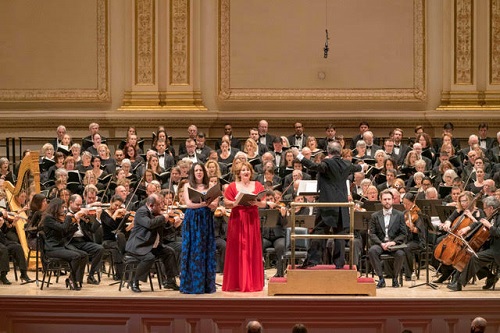 United States Górecki, Szymanowski, Vaughan Williams: Susanna Philips (soprano), Ewa Płonka (mezzo-soprano), Jesse Blumberg (baritone), Chorus and Orchestra of The Oratorio Society of New York / Kent Tritle (conductor), Carnegie Hall, New York, 11.11.2018. (RP)
United States Górecki, Szymanowski, Vaughan Williams: Susanna Philips (soprano), Ewa Płonka (mezzo-soprano), Jesse Blumberg (baritone), Chorus and Orchestra of The Oratorio Society of New York / Kent Tritle (conductor), Carnegie Hall, New York, 11.11.2018. (RP)

© Mark Forman Productions, Corp.
Górecki – Euntes Ibant et Flebant Op.32
Szymanowski – Stabat Mater Op.53
Vaughan Williams - Dona nobis pacem
The Oratorio Society of New York’s commemoration of the centenaries of Polish Independence and the World War I Armistice was perhaps unique among such events as there were neither speeches nor flags flying, just music. Kent Tritle, the Oratorio Society’s Musical Director, led the choir in compelling performances of three powerful works: two by Polish composers that explored loss, redemption and sorrow, and one by a quintessential British composer that is a plea for peace in the face of war.
The concert was part of ‘100 for 100: Musical Decades of Freedom’, an international celebration of Poland’s Independence centenary in which 100 works by Polish composers were performed around the world. It was presented in partnership with the Polish Cultural Institute New York and the Polish Musical Publishing House.
The Oratorio Society was in prime condition, from the crystalline sounds of the sopranos to the rich warmth of its basses. There was a lightness and pliability to its sound that is hard to achieve in large amateur choruses. The singers gamely tackled the complex sounds of the Polish language, but their diction in Latin and English was not quite up to snuff.
Fame found Henryk Górecki (1933-2010) when a 1992 recording of his Symphony No.3 Op.36, also known as the Symphony of Sorrowful Songs, went viral. Composed in 1972, Euntes Ibant et Flebant (‘He that goeth forth and weepeth’), predates the symphony by four years, but in it he employed the same simplified musical textures, tonalities and melodies.
It is a challenge to create intimacy in a space as vast as Carnegie Hall, especially with a restive audience. Tritle properly waited until a semblance of quiet prevailed to begin this intense work. He masterfully guided the higher voices in creating ever denser musical layers until the tension was released by the entrance of the basses singing a chant-like melody. Near perfect intonation resulted in exquisite dissonances that gave bite to the chorus’ beautiful, transparent sounds, achieved even when singing en masse. The choir’s final soft tones reverberated in the hall, now silent and still.
Outside of Poland, Karol Szymanowski (1882-1937) is mostly known for his violin concertos and the opera Król Roger. In his native country, his cultural importance is such that coins were minted to commemorate the seventieth anniversary of his death. He composed the Stabat Mater in the mid-1920s, inspired by personal losses as opposed to the horrors of war. Rather than setting the traditional Latin Marian hymn that relates the Virgin Mother’s suffering as she observed her Son’s crucifixion, he employed a modern Polish translation of the text.
Szymanowski set the prayer, which is scored for soprano, alto and bass soloists, chorus and orchestra, with music that is representative of his signature lush, chromatic, post-Romantic style. The trio of soloists were soprano Susanna Philips, the Polish-born mezzo-soprano Ewa Płonka and baritone Jesse Blumberg. All were compelling, but the velvety-voiced Płonka, wearing a stunning red dress (the Polish national color) and singing from memory was particularly impressive.
The chorus fared exceptionally well in this unfamiliar musical terrain. (It was not, however, the work’s New York premiere. That took place in 1931, also in Carnegie Hall, with Nelson Eddy, today best remembered for his Hollywood films, as the baritone soloist.) In the fourth movement, shimmering a capella singing underpinned Philips and Płonka’s moving duet, a tearful lamentation over Jesus’s death. Later, they sang with terrifying intensity of the flames that await sinners on the Day of Judgment.
Ralph Vaughan Williams (1872-1958) had been an ambulance driver in the Great War (as was Maurice Ravel) and witnessed its horrors firsthand. Alarmed by the rise of fascism, he composed Dona Nobis Pacem in 1936 as a plea for peace when the threat of war once again loomed in Europe. Vaughan Williams turned to the Bible and the writings of Walt Whitman and John Bright for his texts. (Bright is remembered for the 1855 ‘Angel of Death’ speech that he gave in opposition to the Crimean War to no avail.) The work begins with the final phrase of the Angus Dei from the Mass; its last words, ‘Dona nobis pacem’, are repeated throughout and end the work.
It is a piece of profound emotion. Vaughan Williams’ setting of Whitman’s ‘Beat! beat! drums! O blow! bugles! blow!’ practically sings itself – the perfect union of music and text. One’s heart ached as Blumberg gave voice to the words, ‘For my enemy is dead, a man divine as myself is dead’, intertwined with the plaintive solos of concertmaster Jorge Avila and reprised so sensitively by the chorus. Philips’ lustrous soprano repeatedly emerged from the complex musical textures pleading for peace, the final one faintly echoed by the choir.
Tritle held his hands aloft as his choir’s sounds reverberated through the hall. All observed the moment of silence, the only response conceivable on a day when people the world over paused to reflect on the events of 11 November 1918.
Rick Perdian
What a thoughtful and informative review. I attended this concert and was certainly touched by the poignancy of the music and the beauty of its performance. Kent Tritle manages to elicit the very best from his singers and musicians.